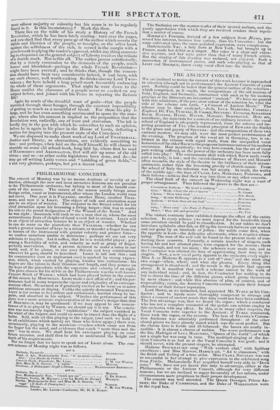THE ANCIENT CONCERTS.
WE are inclined to notice the concert of this week because it approached in selection (though not in performance) the Ancient Concerts of years past. Nothing could be better than the general outline of the selection ; which comprized, as it ought, the compositions of the old masters of Italy, England, and Germany, intermixed with such as by the modern practice of the Directors arc accounted " ancient." We have no quarrel with this admixture, if the prevalent colour of the selection be, what the title of the scheme sets forth, " a Concert of Ancient Music." The scheme may be thus analyzed,—/tay, LUCA :HAREEM°, CORELLI ; Englund, Dr. Tyr:, PulteELI., R. CooKE, STEVENS ; Germany, SEBASTIAN BACH, HANDEL, HASSE, HAY1)N, :MOZART, BEETHOVEN. Here are, manifestly, the materials for a concert of no ordinary interest : the vocal school of England is adequately represented, front the solemn and im- posing grandeur of Tvis (the musical preceptor of EnwAnD the Sixth) to the grace and gayety of STEVENS : and the compositions of these two eminent masters, we may add, were the most perfect performances of the evening. The progress of the vocal art in Germany, too, is ex- hibited in the scheme with equal truth, from the unequalled vocal harmonies of the elder BACH to the gorgeous instrumentation of his modern successors. How manifestly, we may here remark, has the art of vocal part-writing suffered, as the power of the orchestra has been more fully called into play ! The consummate skill with which BACH made every part a melody, is lost ; and the sacred choruses of lLtvnx and MozsaT often resemble the style of the theatre in the brilliancy of their accom- paniments, rather than the becoming gravity of church-music. From the school of Italy the selection was but scanty. In truth, the works of the middle age—the time of CLARI, LE°, MARCELL°, PonponA, and their fellows—seldom find their way into these or any other concerts. The chief fault of the concert on Wednesday- night was a want of proper arrangement. Thus followed the pieces in the first act—
Coronation Anthem, " My heart is Waiting" HANDE L.
wee, Mark, where the silver Queen" It COOKE.
Chorus, '' heat'what Gad" SeaBACH.
Song, ••Komm Harming" (Fide/io) BEEraores.
Anthem, " 0 God, thou art my God" PUIMEGT.
Trio Song, " Dove soon" (Le .1'mze di Figaro) MOZART.
Motel, " How still and peaceful" fr.Tn.
The violent contrasts here exhibited damage the effect of the entire selection. In every scheme (we must repeat for the hundredth time) some attention should be paid to classification. At our tables we don't introduce syllabubs after fish, or fill up the intervals between our mutton and our game by an interlude of jellies : the solids come first, when the appetite is keen—the delicacies afterwards, when it requires stimu- lating. The root of the evil will be found in the present mode of con- ducting these concerts. Formerly, a certain number of singers, each having his and her allotted place, were engaged for the season ; there were enough, and not too many : the schemes were made out, and to the Conductor was allotted the duty of apportioning their duty to the singers. Now, a new vocal party appears in the orchestra every night : Miss A. or Madame 13. appears as a sort of " star," and she must sing two songs—when, where, and what she pleases. Every thing like arrangement is abandoned ; and the result is the jumble that appears above. It is manifest that such a scheme cannot be the work of any individual mind ; and, in fact, the Conductor has nothing to do but to direct the time of the different pieces, which group themselves by mere chance : and while this absence of plan, of control, and of responsibility, exists, the Ancient Concerts cannot regain their former character or their former reputation. Lord Howls, as we intimated, had appointed Mr. TURLE as his Con- ductor; and to hands more thoroughly competent to arrange and direct a concert of ancient music that duty could not have been confided. The first advantage was, that we beard the organ ; which a conductor who has not a complete command of the pedals can seldom employ in this orchestra with any effect. In this, as in many other respects, the Vocal Concerts were superior to the Ancient : if Team!: conducted, Goss took the organ, or the reverse. The best of HANDEL'S Corona- tion Anthems was admirably performed throughout : of the other choral pieces we have already stated which was the most perfect. But the chorus here is feeble and ill-balanced: the basses are nearly in- audible : it is almost a chorus of trebles. The worst performance was the fine Madrigal of Ltios. MARENZIO, "Queen of the world"; of which not a single bar was sung in tune. The madrigal-singing at the An- cient Concerts is as bad as at the Vocal Concerts it was good; and it should never, with the present singers, be attempted.
Madame STOCKHAUSEN sang " With verdure clad," with faultless excellence ; and Miss MAssoN, HAssE's air, " Ad to clainamus," with the finish and feeling of a true artist. Miss CLARA NOVELL° was not so successful in her attempt to give expression to the celebrated song from Fiddly. Madamoiselle NAU acquitted herself very ably in "Dove sono." We have not yet heard this lady to advantage, either at the Philharmonic or the Ancient Concert, although for very different reasons ; but we are inclined to augur favourably of her talents, under circumstances more propitious to their proper development. The concert was well attended. The Queen Dowager, Prince AL- BERT, the Duke of CAMBRIDGE, and the Duke of WELLINGTON were in the royal box.


























 Previous page
Previous page